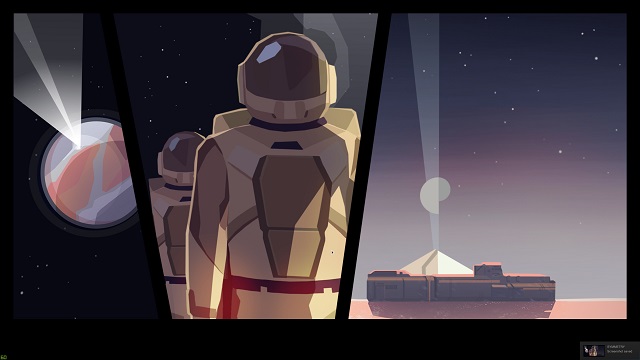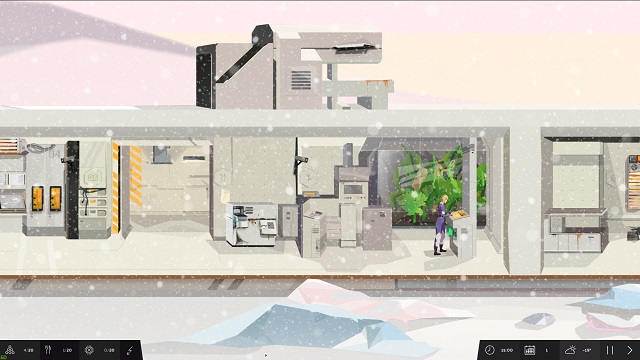By its modern definition, the word symmetry signifies a harmonious balance between two or more objects — something is the same on one side as it is on the other. In our daily lives, we seek out symmetrical objects because their uniformity is calming and relaxing. That’s why stability is often key to disciplines such as interior design and music.
Interestingly enough, Sleepless Clinic developed a game that embodies the antithesis of that dulcet definition. It’s obvious by Symmetry‘s inherent difficulty and sometimes obtuse narrative that this was partly intentional. By what the game does right, it creates a ravenous disquiet within the player that gnaws at the psyche long after the game’s been shut off. And by what it fails to deliver, it nurtures within the player a frustrating desire for answers and resolution.
It’s a symmetry we’re not entirely used to seeing because it’s an inverse of our expectations — a negative symmetry if you will. But in fact, it’s one that perfectly aligns with the stark desperation of survival.

In Space, No One Can Keep You Alive
Nietzsche once said about survival that “to live is to suffer, to survive is to find some meaning in the suffering.” It might at first seem odd to quote a 19th-century German philosopher in a review about an indie survival game, but I think the quote is indicative of Symmetry‘s take on the survival genre itself.
On the surface, and perhaps unlike any other survival game since This War of Mine, the protagonists of Symmetry are indisputably suffering. Crash-landed on a remote, gelid planet without any memory of their derailment or immediate hope of escape is the textbook definition of hardship.
And being a roguelite, Symmetry exacerbates that hardship by giving you a new set of survivors each and every time you play. Some survivors will have erudite knowledge in power plant repair, while others will be master horticulturalists. Some will have experience as lumberjacks, while others will be meticulous scavengers. These variances will inform your strategies and how you go about playing Symmetry on a molecular level.
But one thing remains the same no matter what — the fact that these people are going to die. Some will freeze to death. Some will starve. And some will keel over from exhaustion. Because of Symmetry‘s unforgiving difficulty, mortality is a thin veil in the wilds of space. And using the skills of each character at the right moments is key to surviving even a few days, much less the weeks it takes to finish the game.

The Monotony of Endurance
There’s no doubt Symmetry is a polarizing game. Whereas other survival titles often employ moments of action to break up the monotony of staying alive, Symmetry embraces the tedium of endurance — perhaps a whit too much. There’s no doubt its gameplay captures the mundane reality of true survival — and there’s no doubt many gamers will love it because of that. But other gamers will loathe it for that very reason.
On normal difficulty, Symmetry can be beaten in about three hours. All of that time is spent deftly micromanaging needs and tasks, commanding characters from one point to the next, from one task to another. And in the end, your most pressing concerns are delineating who makes food and who eats it — or who cuts lumber and who heals their wounds.
That’s Symmetry‘s gameplay — people management. It’s watching them live droll, meaningless lives that ultimately lead them to madness. As the game progresses, machines will break and you’ll lose power, while the weather will become even more dangerous, killing characters faster and faster.
Despite a story that draws you in with skillful mystery and adroit science-fiction elan alongside a stunning atmosphere and score, Symmetry‘s gameplay boils down to watching meters rise and fall.

Verdict
When you peel back the curtain, Symmetry reveals itself as an uneven survival experience because of rote second and third act gameplay, gameplay that relies too heavily on the managerial aspects of life and death, not its painful verisimilitude. As its bleak, heady story unfolds and truths expose themselves from the flickering, snowy shadows, you’ll find that a few additions to Symmetry‘s core gameplay could have kept it more firmly in orbit for the latter part of its journey.
There is meaning to the suffering — it’s just a question of if you can survive until the end to find it.
You can buy Symmetry on Steam for $11.99
[Note: The developer provided a copy of Symmetry for this review.]






Published: Mar 2, 2018 11:43 am